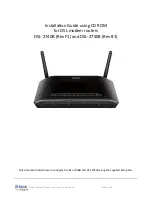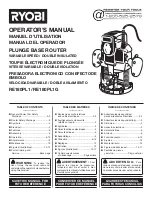
P-660RU-Tx v 3 Series Support Note s
A D SL FA Q
1. How does ADSL com pare to Ca ble modems?
ADSL pro vides a dedicated service o ver a single telephone line; cable m odems
offer a dedica ted service o ver a shared m edia. While cable m odems have
greater downstream bandwidth capabilities (up to 30 Mbps), that bandwidth is
shared among all users on a line, and will therefore vary, perhaps dram atically,
as m ore users in a neighborhood get online at the same time. Cable m odem
upstream traffic will in m any cases be slower than ADSL , either because the
particular cable m odem is inherently slower, or because o f rate reductions
caused by contention for upstream bandwidth slots. The big difference between
AD SL and cable modems, however, is the num ber of lines available to each .
There are no m ore than 12 million homes passed today tha t can support
two-wa y cable m odem transmissions, and while the figure also grows steadily, it
will not catch up with telephone lines for m any years. Additionall y, m any of the
older cable networks are not capable of offering a re turn channel; consequently,
such networks will need signif icant upgrading before the y can offer high
bandwidth services.
2. What is the m icro-filter or splitter used for ?
Generally, the voice band uses the lower frequency ranging from 0 to 4KHz,
while ADSL data transm ission uses the higher frequency. The m icro filter acts as
a low -pass filter for your telephone set to ensure that ADSL transm issions do not
interfere with your voice transmissions. For the details about how to connect the
micro filter please refer to the user's manual.
3. How do I know the ADSL line is up?
You can see the DSL LED Green on the P-660RU -Tx v3 's front panel is on when
the ADSL ph ysical layer is up.
4. Does the VC-base d m ultiplex ing perform better tha n the LLC-based
multiplexing?
Though the LLC -based multiplexing can carry m ultiple pro tocols over a single VC,
it requires extra header information to identify the protocol being carried on the
virtual circuit (VC). The VC -based m ultiplexing needs a separate VC for carrying
each protocol but it does not need the extra headers. Therefore, the VC-based
multiplexing is m ore efficient.
We can choose one of them on the web configuration page:
Interface Setup
->
Inter net ->Dynam ic IP ->Encapsulation:
20
All contents copyright © 2008 Zy XEL Communications Corporation.
















































